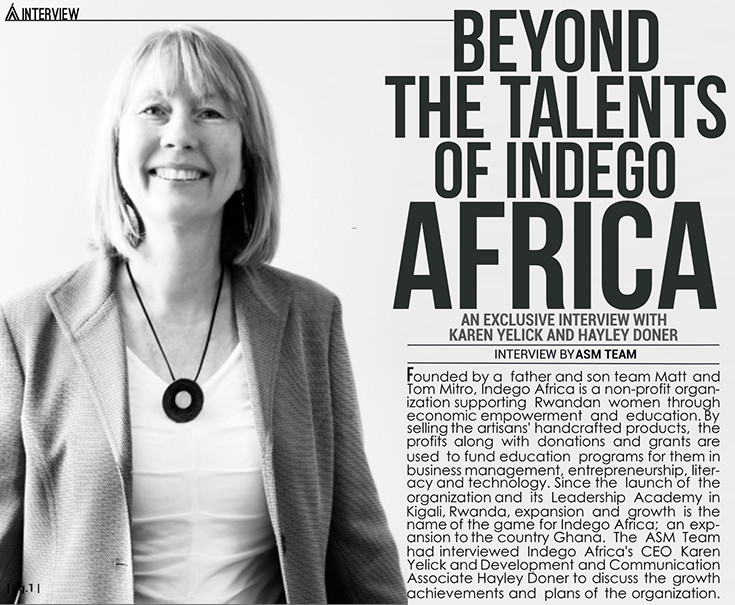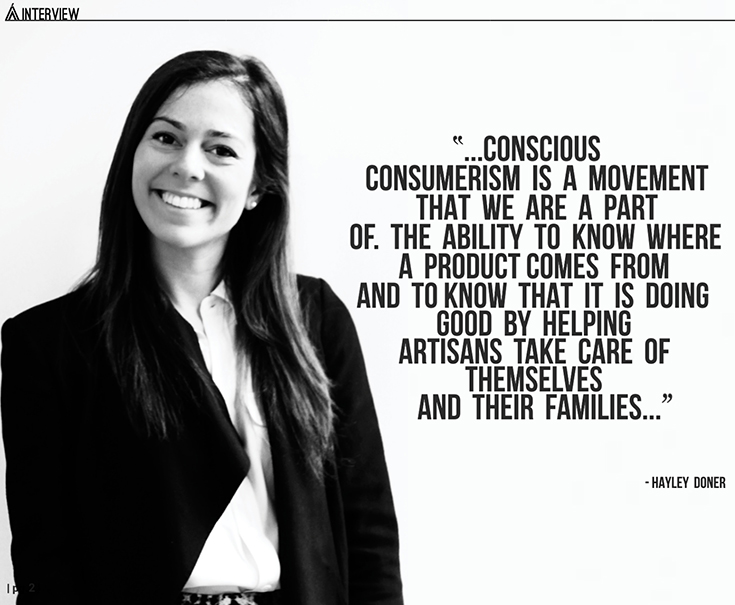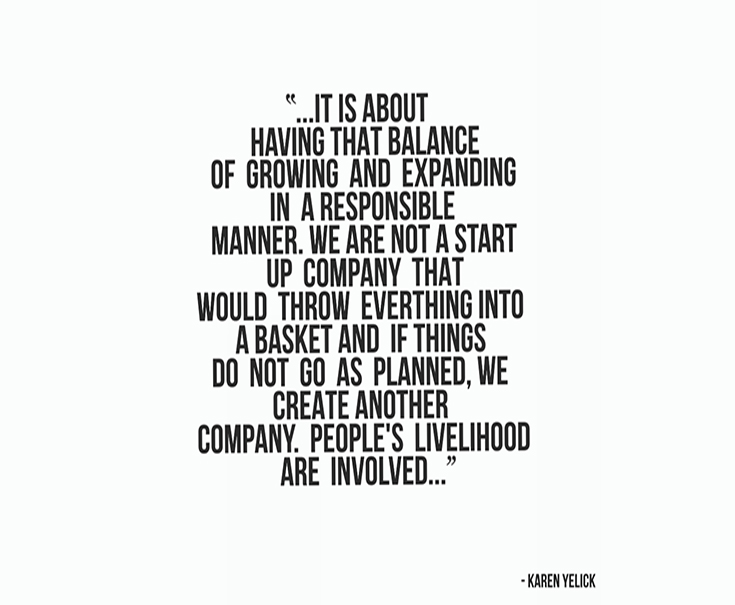



ASM: Why was the organization Indego Africa created?
IA (Karen): Indego Africa was founded in 2007 by a young attorney named Matt Mitro who had spent many years living in different African countries as a child. After attending college in the United States, going to law school and had begun to practice as an attorney, he found himself continuously drawn to the memories of the hardworking, innovative and creative African artisan women he had met in his youth. Despite their incredible talents, these women were struggling to get by without markets to sell their goods or the education needed to run their businesses. Matt wanted to create an organization that would address these challenges of access and opportunity – helping artisans earn sustainable income for their work and receive education. From there, Indego Africa was born.
ASM: What inspired you to join Indego Africa?
IA (Karen): The bulk of my career was in Finance with Merrill Lynch, where I worked for twenty-four (24) years. In 2011, I decided it was time to make a transition. I knew my next role would be in social enterprise. I have a passion for women, children and education; and had traveled to Kenya when I was younger—an experience which I cherish. When I was searching for a new opportunity, I came across Indego Africa, which was looking for someone with a business background. I joined as its CFO in 2012, and the rest is history.
ASM: We noticed a powerful sentiment. We are focused and invested in what we do because we want to know the back story. Would you say that things of Africa are widely recognized? If so, why?
IA (Karen): It is two things. It is about market access, and it is about education. There are so many talented artisans around the globe. At an event in Washington DC, the Secretary of State John Kerry said there are thirty-two billion dollars’ worth of products made by artisans globally; however, the industry is fragmented and mostly individual artisans working in rural areas. Part of Indego Africa’s mission, goal and value is to help bring these products to markets in the United States and the Western world. We help artisans understand the market that they are making handmade products for and also provide them with business education so that in the long term they can take more control of the supply chain.
IA (Hayley): From a consumer standpoint, part of the story we are telling as a brand is about empowering women to lift themselves out of poverty and become financially independent. We definitely want consumers to know where these products come from and the impact they have on people’s lives. Over the last decade or so we have seen a lot push back and controversy around the world about companies that do not treat their employees fairly. There is a growing movement of conscious consumers that stand behind what Indego Africa is all about and cherish knowing that each product helps a woman provide for herself and her family. The millennial generation in particular is willing to go the extra mile and take the extra time to research and learn more about that the products they are purchasing, which is a great thing for the women we work with. One way to look at it is: we are all consumers, making purchases every single day. So why not buy from brands that are also helping the global community?
IA (Karen): A revolution is going to come in the way that people purchase products.
ASM: What are your favorite products or what products stand out that people buy?
IA (Karen): I am really excited about our Nursery Collection and what we are doing with baby and children’s clothes. The prints and patterns are wonderful and look adorable too.
IA (Hayley): I love our baskets! They are all so beautiful and the perfect way to add a pop of color into any home.

ASM: Have you been there to work with these artisans who work on these products?
IA (Karen): Oh yes. It is best to spend time there in person to build trust and a culture of global collaboration. We have a wonderful local team in Rwanda that oversees our social impact programs as well as production – visiting our partner artisan groups five days a week to go over orders, quality control, and make sure deadlines are met. Hayley works on our blogs and can tell you more about the artisans.
IA (Hayley): We feature the amazing artisans we partner with on our website and on our blog. For example, one of the first people we worked with in Rwanda is named Emilienne Nyiramana. She is the founder of the Cocoki Cooperative, a sewing group in Kigali. When our founder met her in 2008, she was struggling to get her business off the ground and make ends meet. She came on board as one of our first artisan partners and enrolled in our education programs. Since then, she has emerged as an incredible mentor, leader, and inspiration for women across Rwanda. She has taught herself fluent English, won numerous awards, graduated from the Goldman Sachs 10,000 Women Program and is now a full-time employee of Indego Africa. She truly embodies the vision of Indego Africa and we are so proud to work with her. Emelienne is one example of many women across Rwanda who are emerging as talented leaders and business-owners. Our partners are determined to succeed, and they work hard to get there.
IA (Karen): We provide the tools – the women have the motivation and the talent.
ASM: What are some of the challenging moments you faced with Indego Africa and how did you overcome them?
IA (Karen): I define success as sustainability and one of the challenges we always face is how to manage growth and ensure we can continue to reach more people. We are not like a startup that will just jump into something and if doesn’t work out, start another company. We have a lot of people within our community and we have to be responsible in how we manage our growth. It is all interconnected and we want to keep moving forward and providing our partners with the market access and education that is changing their lives.
ASM: What countries should we expect Indego Africa to expand to in months or years to come?
IA (Karen): It has always been in Indego Africa’s strategic vision to take the model that worked in Rwanda and bring it to another country – which, I am excited to say, will be Ghana! Before we made the decision to launch in Ghana, we did a really thorough analysis looking at ten countries, paying attention to many variables such as the need for social impact, artisan skills, logistics, corruption index, and so on. It came down to Ghana, Ethiopia and Tanzania. For a variety of reasons, we went with Ghana, but we are still interested in expanding further. If you were to ask me the next country Indego Africa would likely to expand into, I would say it would be Ethiopia. There is also Burundi underneath Rwanda and we are hoping to collaborate with some organizations there in the future. There are also countries around Ghana that could be possibilities but it is still too early to say.
ASM: What would you say is your most beautiful experience or memory working with Africans in Africa? What lessons have your learned?
IA (Karen): For me as a working mother, I am truly amazed and inspired by how universally women around the world want to do the best that they can for themselves and their family despite the odds. It inspires me so much because these artisans have had the decks stacked against them but it does not stop them from persevering.